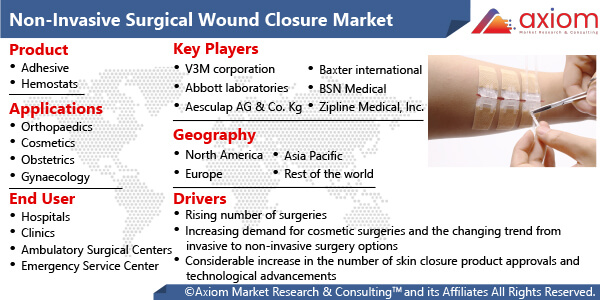Wound closure is often considered as a routine part of surgeries, however, complications such as surgical site infection, wound dehiscence and scarring can occur. Traditional methods of skin closure that use staples, nonabsorbable running or interrupted sutures, or intradermal absorbable sutures have low complication rates, but these can cause microtrauma to the epidermal skin and microvascular blood supply. Complications associated with staples and sutures include wound dehiscence, infection, wound inflammation, discharge and drainage, abscess formation, skin-edge necrosis and allergic reaction. The non-invasive surgical wound closure avoids the need for staples, sutures, butterfly closures or other final skin closure devices. This device is designed to distribute the surgical incision tension uniformly throughout the skin closure and to flex with the patient’s motions while potentially reducing the risk of hypertrophic scarring. It offers protection from shear forces, which some research has shown may result in increased scarring.
Non-invasive Surgical Wound Closure Market Outlook
The market value of non-invasive surgical wound closure is growing progressively, propelled by rising number of surgeries globally. Additionally, increasing demand for cosmetic surgeries and the changing trend from invasive to non-invasive surgery options are opening new possibilities for the utilization of non-invasive surgical wound closures that could turn into lucrative future businesses. Non-invasive procedure saves doctors time in the accident and emergency department where the patient inflow is high, thus triggering the non-invasive surgical wound closures demand from various users. Moreover, considerable increase in the number of skin closure product approvals and technological advancements are some of the opportunities which are expected to fuel the growth of this market in coming years. However, the market is hampered by low penetration of non-invasive surgical wound closures in underdeveloped countries.
Non-invasive Surgical Wound Closure Market Segmental Overview
The report analysis the non-invasive surgical wound closure market based on product type, application, end user and geography.
Non-invasive Surgical Wound Closure Market by Product Type
Based on product type, the market is segmented into adhesive and hemostats. Various adhesives mentioned in the report are natural, synthetic and adhesive barrier products. Whereas, the hemostats include active, flowable, mechanical and sealants such as fibrin and surgical. Adhesives are used for the fixation of implants, closure of cerebrospinal fluid leaks, tissue adhesion and embolization of blood vessels. Moreover, tissue adhesives are used for groin wounds, facial wounds, blepharoplasty, hand surgery, hair transplantation, laparoscopic wounds and lacrimal punctum closures.
Non-invasive Surgical Wound Closure Market by Application
Based on application, the market is segmented into orthopaedics, cosmetics, obstetrics & gynaecology and other applications. The force distribution system of wound closure devices is designed to provide uniform closure forces as well as create an isolation zone around the incision to protect it from patient-induced distraction forces. They are very effective in surgeries including total hip, knee and shoulder, arthroplasty, spinal fusion, skin excision, lacerations etc.
Non-invasive Surgical Wound Closure Market by End Users
Based on end user, the market is segmented into hospital, clinics, ambulatory surgical centers and emergency service centers. Non-invasive surgical wound closures are painless, rapid and effective devices, requiring no anaesthesia. It has the potential of becoming the standard of care in settings that require rapid wound closure especially under adverse conditions.
Non-invasive Surgical Wound Closure Market by Geography
By geography, the global non-invasive surgical wound closure market is studied across the countries of key regions such as, North America, Europe, Asia Pacific, and Rest of the world. North America accounted for the largest market share in 2018, followed by Europe and Asia-Pacific. The North American market for non-invasive surgical wound closure makes an important contribution to the growth of the global market. This fact is shown by the growth in revenue of leading producers of non-invasive surgical wound closures in this region. Also, high healthcare expenditure, demand for cosmetic surgeries and high disposable income is further contributing to the market growth this region. In addition to this, the Asia-Pacific region is expected to grow at a lucrative growth rate during the forecast period. This growth is accredited to growing consumer disposable income and increasing awareness regarding non-invasive surgical procedures.
Non-invasive Surgical Wound Closure Market Key Players
Some of the major players operating in the global non-invasive surgical wound closure market include 3M corporation, Abbott laboratories, Advanced medical solutions group plc, Aesculap AG & Co. Kg, Baxter international, BSN Medical, CP medical, Inc., Derma sciences, Inc., Ethicon endo-surgery, Inc., Medi-zip GMBH, Medtronic PLC, Pro-motion medical b.V., Smith & Nephew PLC, Surgical specialties corporation, Takeda pharmaceuticals international Gmbh (Nycomed pharma Gmbh), Teleflex medical OEM and Zipline Medical, Inc. Market players are involved in product launches and collaboration agreements to exploit maximum revenue potential in global market. For instance, in September 2017, ZipLine Medical, Inc announced results from an economic study that showed that Zip surgical skin closure reduced post-discharge costs for total knee arthroplasty (TKA) when compared to staples. The company also received China Food and Drug Administration (CFDA) approval for zip surgical skin closure device in December 2016.











